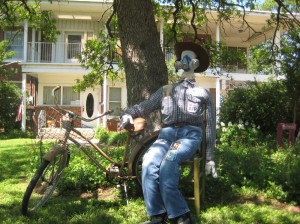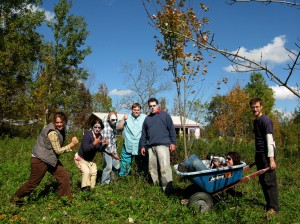********

The slogans can be as simple as a circle with a red line over the word frack. Or they can take off on movies like Robert De Niro’s Taxi Driver comment, as in, “Are you fracking with me?” The t-shirts and posters are available in national catalogs and all over the internet.
In North Texas, there’s “no question we were fracked,” said Calvin Tillman, the former mayor of DISH, Texas, whose town was so crisscrossed with pipelines and compressor stations that he finally sold his home at a loss and moved away so that his family could begin to recover from the chronic nosebleeds and other health problems they had developed. “And I’m glad to have that word to describe what the industry does. It’s a bad word.”
Ruggiero and Tillman founded Shaletest, a nonprofit organization that provides baseline testing of air and water around drilling operations for lower-income families. Ruggiero said that the number of “Don’t frack with me!” kinds of yard signs in the Marcellus Shale is huge.
One of the most hilarious multiple uses of the word came in a 2010 skit performed on the Canadian television show This Hour Has 22 Minutes. The skit opens with a newscaster introducing a distraught homeowner who claims that “These fracking companies come in and start fracking everywhere …. my water used to be completely clear and now it’s completely fracked.”
A fracking expert is introduced who tells her she’s the victim of a lousy frack, maybe even of having been “clusterfracked.”
The housewife then asks if these “fracking guys can just come in and frack my gashole without permission?”
Last week The New Yorker ran a zinger-filled satire piece called “Cranial Fracking” about the mythical process of harvesting “the vast reserves of natural gas found in the human head.”

After cranial fracking, “Yes, now everything tastes like pineapple to me,” Ian Frazier wrote, “and there’s the pain, and I have these Christmas-tree valve arrays that make it impossible to fly on airplanes, and my pores combust spontaneously if I don’t keep the moistened towels on, but I recommend the procedure without reservation.”
If “fracking” is now being used as a weapon against the industry that created the term, it’s only the latest example of spin in the gas patch, something that’s been part of the process since the beginning.
When the landmen first hit the Barnett Shale almost 10 years ago and began collecting leases for gas development, they had some nice buzzwords to throw around, like “mailbox money.” People signing away their mineral rights were going to get royalties in the form of monthly checks delivered right to their mailboxes for the next 30, maybe even 50, years. The idea of steady, free money temporarily blinded most of the people in the Barnett Shale to anything else that might be involved in the drilling of those wells.
When residents of Fort Worth, the epicenter of the Barnett Shale, began doing the math and realizing that their mailbox money was not going to amount to much, the landmen simply added “bonus money” — money paid at the lease signing — to their phrase list and began offering larger and larger bonuses to secure those leases. If some of them later reneged on the agreements worked out via neighborhood associations, well, it was just business.
It wasn’t until actual drilling began that residents realized all the other innocent-sounding words that were being used to dress up a very dirty business. Those “water trucks” barreling through their neighborhoods, they found, were not only endangering kids and tearing up their streets, but the “water” they carried was often laced with highly toxic chemicals.












How about: “Stop Fracking Up My Water Supply” or “Stop Fracking Up Our Aquifers”….. Millions upon millions of gallons of water (that cannot be replaced) being pulled from Texas aquifers even during drought conditions. People who had good, producing water wells just a few years back which are now going dry. And what do we get from the TCEQ???……. Crickets chirping………
I noticed over the past few weeks that when I’ve read or heard a nat gas story in the paper, tv, or magazine they recently have been opting for the phrase ” hydraulic fracturing” rather than the f-word. I doubt that shift in word choice is accidental.
still no print view? why?!?!?!?
Fort Worth and Arlington are all fracked up. What cities allow outside corporations to invade and take over enitire communities like this only to turn them into industrial zones? It is time to stop the build out and start class action lawsuits. Why has Southlake managed to keep the frackers out while we welcomed them? Do we really think this is good for property values or quality of life? Who would want to live here now? We’re friggen frieken fracked.
Hey Liz.. guess what, they are almost gone. There are only 7 rigs operating in Tarrant county today, Wise has 9…that’s a first.
Of course I hope your well being (your business or job) doesn’t rely on the Barnett because along with the drilling goes the jobs, services, welders, drivers, dirt work, fence, landscaping… you get the idea.